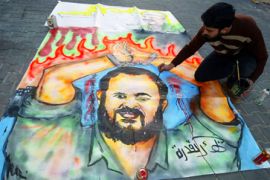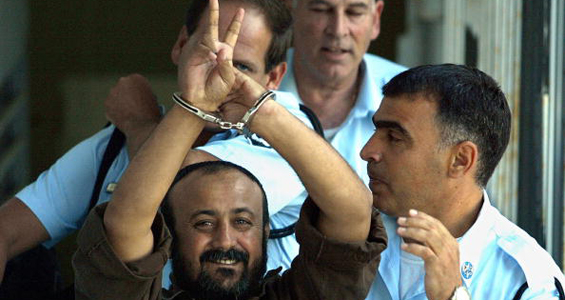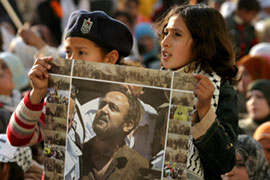Profile: Marwan Barghouti
Jailed Palestinian leader elected to governing body of Fatah movement.

 |
| Barghouti is serving five life sentences in an Israeli jail on murder charges [GALLO/GETTY] |
Jailed Palestinian leader Marwan Barghouti has been elected to the governing body of the Fatah movement of Mahmoud Abbas, the Palestinian president.
Barghouti, 50, gained political authority as a major leader of the first and second Palestinian Intifada (uprising) against the Israeli occupation.
Currently serving five life sentences in an Israeli prison, Barghouti was detained by Israeli authorities in April 2002 and charged with the murder of Israeli citizens.
An Israeli court convicted him two years later on five counts of murder and one count of attempted murder resulting from three suicide attacks that killed four Israelis and a Greek Orthodox monk and one failed attack.
Israeli occupation
Born in 1959 in a village near the West Bank city of Ramallah, Barghouti was nearly eight years old when Israel began its occupation of the West Bank and Gaza.
| In depth |
|
|
At the age of 15, he became active in the Fatah movement, and was soon arrested and jailed by Israel on charges of being involved with armed Palestinian groups.
Following his release, Barghouti returned to the West Bank where he enrolled at Bir Zeit University.
One of the main leaders of the first Palestinian Intifada in 1987, Barghouti led Palestinians against the Israeli occupation of the West Bank, until he was arrested and deported to Jordan.
He was permitted to return in 1994 under the terms of the Oslo Accords.
Barghouti rejected the Oslo peace negotiations, and later became a key figure in the early days of the second Intifada that began in September 2000, in which he condoned the use of force to expel Israelis from the West Bank and Gaza.
But he has said he opposes attacks on civilians inside Israel.
In an opinion piece published in the Washington Post newspaper in 2002, Barghouti said Palestinians must have the right to protect themselves.
“And while I, and the Fatah movement to which I belong, strongly oppose attacks and the targeting of civilians inside Israel, our future neighbour, I reserve the right to protect myself, to resist the Israeli occupation of my country and to fight for my freedom,” he wrote.
“If Palestinians are expected to negotiate under occupation, then Israel must be expected to negotiate as we resist that occupation.”
Popular figure
Even from prison, Barghouti has remained a popular figure among many Palestinians, with many insisting that the charges against him were false and motivated by politics.
 |
| Barghouti has remained a popular figure among many Palestinians [EPA] |
Once seen as a successor to Yasser Arafat, one of the founders of the Fatah movement, Barghouti is presently viewed as a potential successor to Abbas.
He was first elected to the Palestinian Legislative Council in 1996 as secretary-general of Fatah in the West Bank, where he began to voice opposition to what he said was corruption in the Fatah movement.
A key political figure, Barghouti has also urged Palestinian reconciliation.
He supports a two-state solution to the Israeli-Palestinian conflict, and is seen by many as a leader who could potentially garner support for a peace deal resulting in the creation of a Palestinian state.
“I still seek peaceful coexistence between the equal and independent countries of Israel and Palestine based on full withdrawal from Palestinian territories occupied in 1967…,” he wrote in 2002.
“I do not seek to destroy Israel but only to end its occupation of my country.”

